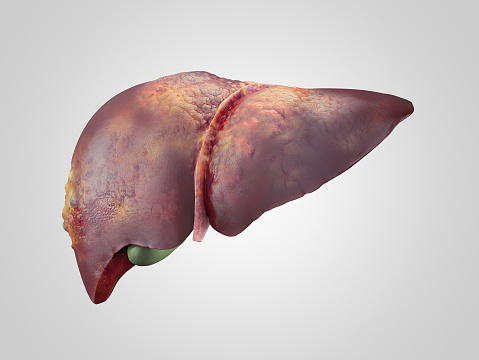
The liver is one of the most vital organs in the human body. Sitting just below the rib cage, the liver is responsible for critical functions like iron and sugar metabolism, even as far as producing protein.
The liver's size is no larger than a regulation size football. Unfortunately, the liver can go bad. Liver damage can result from several factors—both man-made, and inherited. From obesity, to alcohol abuse, to viruses, a lot could be behind a malfunctioning liver. Sustained liver damage could ultimately result in cirrhosis. Such liver scarring can be fatal, especially triggering acute liver failure.
When it gets to these extremes, the individual loses his liver function. This is otherwise known as a fulminant hepatic failure. This condition can result in further complications like amplified brain pressure and excessive bleeding. Treatment for liver damage—or, ultimately, acute liver failure—depends largely upon the cause. The good news is if liver damage is detected early enough, the patient has increased chances of winning the battle. Commonly, to fully restore a liver after failure, a transplant could the best way to go.
Having established the importance of early testing, you should be curious about which symptoms strongly suggest liver damage. Liver damage (or acute liver failure) can manifest in symptoms like jaundice (wherein the patient’s eyes or skin yellows), swelling of the abdomen, vomiting and nausea, drowsiness, malaise, confusion, tremors or even pain in the upper right abdomen. How about we explore some of the major causes of liver damage?
The causes of liver damage:
Excessive Vitamin A intake from supplements
Your body loves vitamin A, but the source matters. The body covets vitamin A accrued from natural plant sources like vegetables and fresh fruit. However, Vitamin A derived from supplement sources is not equally healthy. Specifically, an excessive intake of such vitamin A from supplements can be injurious to your liver. And how? Vitamin A is predominantly stored in the liver. With increased intake, vitamin A content would accumulate there, causing more toxicity. This is termed hypervitaminosis A.
This condition's effect depends upon how much Vitamin A is accumulated in the liver and how fast. An extravagant consumption of provitamin A like beta-carotene can trigger the yellowing of the skin and dizziness.
Excessive intake of sugar
Yes, excessive sugar intake will damage your teeth, but that is not where the devastation ends. Such a lavish intake of sugar can go as far as hurting your liver. Fructose is one crucial sugar type that the liver utilizes in the production of fat. But when it gets too much—especially in high-fructose corn syrup or refined sugar—there is fat accumulation. This can result in liver disease.
Studies are pointing to sugar having almost the same destructive impact on the liver as alcohol. This is regardless of the patient being overweight. Therefore, it is wise to cut down on yummy intakes like pastries, soda and other high-sugar foods like candy.
Too much weight
It is true, Hollywood glorifies six-pack abs and all of that contemporary fitness frenzy. But it is not only Hollywood; even your liver cherishes fitness too. An excessive buildup of fats in your liver cells is not good news. When fats start collecting in your liver, there is a heightened risk of suffering non-alcoholic fatty liver disease (NAFLD). Consequently, this could trigger liver swelling, culminating in scarred or hardened liver tissue. This condition is termed cirrhosis.
No body shaming, but overweight people have higher chances of suffering NAFLD down the line. But of course, a deliberate reversal to healthy dieting and exercise could save you from the disease.
Do you know herbal supplements can harm your liver?
Some native remedies can trigger toxic liver damage. Herbal supplements like cascara, comfrey, aloe vera, kava, black cohosh and ephedra can harm your liver. More specifically, an herbal supplement like kava is famously used for alleviating menopausal symptoms. Studies have, however, shown that kava interrupts the liver's standard functionality. It is always recommended to consult your doctor before taking herbal supplements.
Soft drinks damage your liver
Yes, you read that right: Soft drinks may not be too soft on your liver! According to the Daily Telegraph, just consuming two soft drinks daily will damage your liver for the long term. An insightful study shows that “fizzy” drinks can even rival the detrimental impact of alcohol on your liver. This study establishes that sustained consumption of soft drinks with significant sugar content can increase the chances of suffering fatty liver disease.
And what transpired in this study? The researchers studied 60 patients experiencing NAFLD, specifically analyzing their dietary intake, and spanning their fizzy drink habits. This was measured against 18 control subjects with healthy livers.
The study discovered that patients with a significant intake of soft drinks tend to develop NAFLD when measured against the study participants who don't. The love of your liver should be enough to slash down your soda intake if you were binging on it before.
Acetaminophen can damage your liver
Acetaminophen is famously used in treating headaches, backaches, colds, toothaches and even menstrual pain. When taken precisely in line with recommendation, acetaminophen does no damage to your liver. People with liver disease can safely take acetaminophen so long as they stick to the dosage from certified health providers.
Acetaminophen only damages the liver when it is taken in excess. Never take even the smallest dosage of acetaminophen more than directed, regardless of the lack of improvement in your fever or pain. Also, abstain from administering acetaminophen on yourself for more days than your practitioner recommends. While most liver damage causes we have examined so far are human-made (especially in terms of inordinate lifestyle choices), some liver malfunctions or diseases are genetically inspired.
The two most prevalent types of inherited liver diseases are alpha-1 antitrypsin deficiency and hemochromatosis. Let us dig into them a bit further.
What is hemochromatosis?
This is a condition where there is a dangerous buildup of iron deposits in the liver. This notoriously ranks as one of the most inherited liver conditions in the United States. Specifically, hemochromatosis is more widespread in people of Western European ancestry.
Statistically, one in every 200 Americans has hemochromatosis. Yet, the bulk of these people don’t even know they have this condition. Hemochromatosis is so genetically rampant that once a family member develops this condition, just about every other member of that family (from siblings to children to parents) is predisposed acquire to the disease.
Indeed, the impact of such accumulated iron deposits is more prevalent in men as compared to women. This is because women—due to blood loss during menstruation—are less predisposed to manifesting such iron overload symptoms until probably after such women hit menopause.
What is alpha-1 antitrypsin deficiency?
This is the second most inherited liver disease around. Here, alpha-1 ant—which is a critical liver protein—is either deficient in blood or entirely missing. This disease doesn’t stop the patient’s system from producing protein. Rather, it restricts such protein to the liver, inhibiting the passage of that crucial protein into the bloodstream.
Being that this protein plays a vital role in lung protection, such inhibition of this alpha-1 antitrypsin from penetrating the bloodstream will not only lead to liver damage (eventually resulting in cirrhosis), but it can also cause severe difficulty in breathing.
What complications can arise from liver damage?
Liver damage can trigger some complications, especially when it has deteriorated into acute liver failure. Some of these complications include an excessive buildup of brain fluid.
This is a condition called cerebral edema. Such pent-up fluid can increase cerebral pressure leading to confusion, overall disorientation or, in worse cases, even seizures. Patients with damaged livers have an increased chance of developing infections. Liver failure puts an individual at increased susceptibility of contracting diseases in the urinary tract and blood.
So, for now, we have explored some of the root causes of liver damage. As always, a healthy lifestyle (including the right diet and exercise program) can significantly sustain the health and optimal functionality of your liver. Live life, and live healthily!









